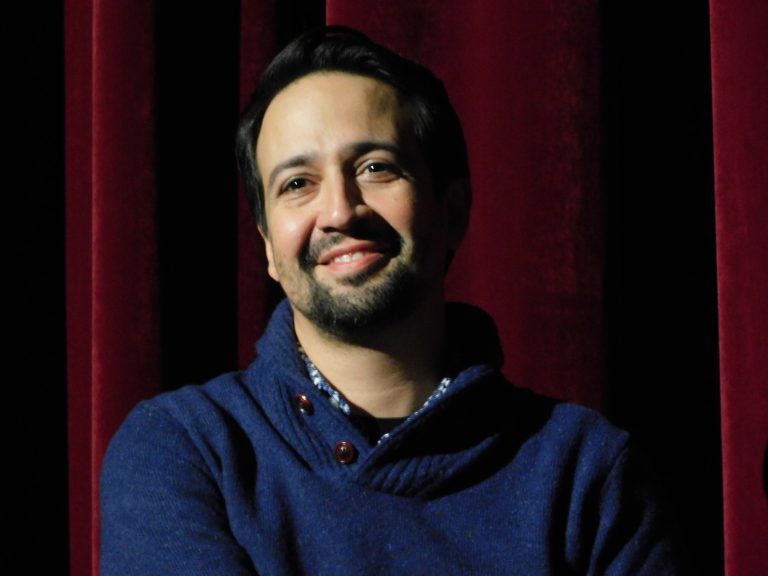
Synopsis : Pulitzer Prize and Tony Award winner Lin-Manuel Miranda makes his feature directorial debut with tick, tick…BOOM!, an adaptation of the autobiographical musical by Jonathan Larson, who revolutionized theater as the creator of Rent. The film follows Jon (Academy Award nominee and Tony Award winner Andrew Garfield), a young theater composer who’s waiting tables at a New York City diner in 1990 while writing what he hopes will be the next great American musical. Days before he’s due to showcase his work in a make-or-break performance, Jon is feeling the pressure from everywhere: from his girlfriend Susan, who dreams of an artistic life beyond New York City; from his friend Michael, who has moved on from his dream to a life of financial security; amidst an artistic community being ravaged by the AIDS epidemic. With the clock ticking, Jon is at a crossroads and faces the question everyone must reckon with: What are we meant to do with the time we have? tick, tick…BOOM!
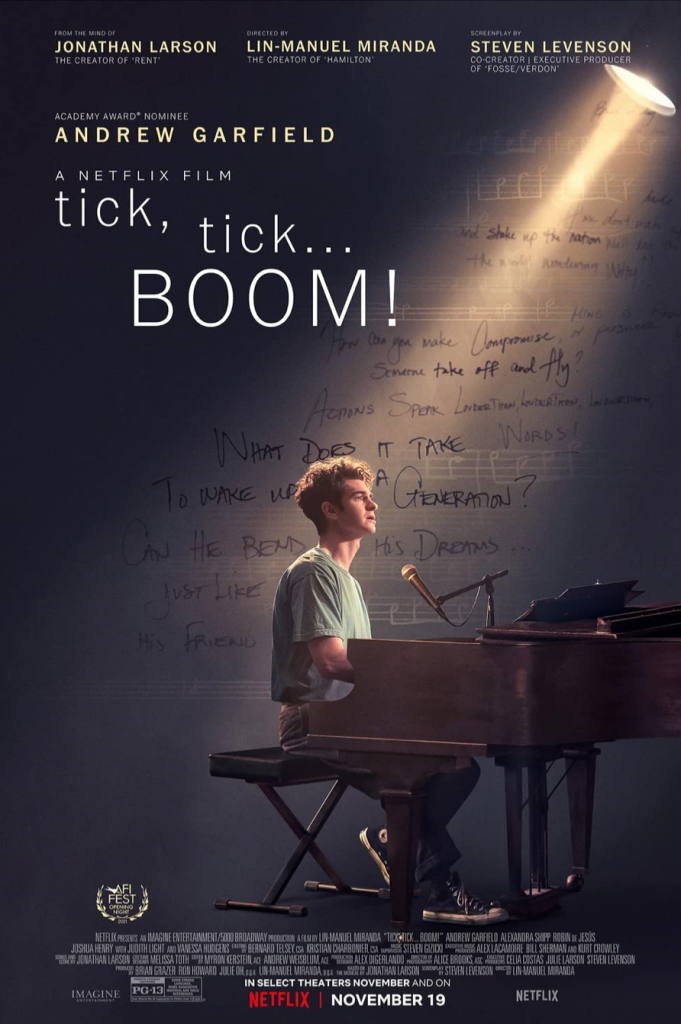
Q&A with Director Director Lin-Manuel Miranda, and Actors Andrew Garfield, Alexandra Shipp, Robin de Jesus, Vanessa Hudgens, Joshua Henry
Q: Could you walk us through your journey with this movie and what does it mean to be telling this story?
Lin-Manuel Miranda : I’m so happy to see people gathering in the dark to watch a movie. There are things in this movie that I really wanted you to experience in a crowd, and I am so glad. I feel like I’m keeping a promise to – you know, you’re always trying to keep promises to younger versions of yourself. And I feel like I’m keeping a promise to seventeen-year-old Lin, whose wig was blown back by winds in the back row of the mezzanine of the Nederlander Theatre. I saw the brilliant role in the Jonathan Larson play “Rent”, three times, and the first time I saw it, it hit me with such a force that I ditched my girlfriend and wandered off, I got her a cab first, I’m not a total monster. But I definitely felt, I can’t go home, I have to think about my whole life, and walked off into the night and on 14th Street, I don’t know where I ended up. I don’t remember the end of that night.
So this show has been sitting in my head and in my heart for a long time. All the credit really goes to my producer Julie Oh, who thought it would be a great movie. She saw me in it in 2014, when I was at a total crossroads in my life. I was post-“In the Heights”, pre-“Hamilton”. I was starring with my co-star from “In the Heights”, and my future co-star from “Hamilton” with Karen Olivo and Leslie Odom Jr. I was super-pregnant with “Hamilton”, and my wife was super-pregnant with our first child, and everything was just like in limbo. I was in the limbo’s limbo. That’s where Jonathan is, and it was like I was just dumb enough to be able to play it once. I was very capable of that. So Julie got the rights, she emailed me, I said “I’m the only person who can direct this.”
Q: I know that you have said that you knew right away that Andrew was the right person to play Jonathan Larson. Andrew, what did you think the first time you were approached about this movie, as somebody who had not sung on film before?
Andrew Garfield : Well, before I even knew what it was, the hope I had was if Lin would talk to me about something, I immediately said yeah, sure, whatever that thing is, I will do it. Like anyone in this room would. And then he introduced me to my long-lost brother that I didn’t know existed: Jonathan Larson, someone that I look up to so much, and it now occupies a pretty active chamber in my heart forevermore.
I’m indebted to this man for introducing me to an ancestor that I didn’t know I had: Someone who is a revolutionary artist, someone who saw the heartbreak and pain of the world, and took his own heart and made beauty and art and community out of this. Someone who was massively representational for his entire community: all colors, all creeds. Someone who wanted to flip this city on its head and to remind us of our connectedness, to remind us that you are the other me and I am the other you. Someone who’s a warrior for art. These are all things that I long to live into, and especially now, having lived with Jonathan and allowed Jonathan to live through me in this experience.
So it was an immediate “Yes” – with a caveat: when did you want to shoot, because I’ve never sung before in my life. Lin said maybe you would like a year, and I said “Yeah, I can sing, I’m fine, I’m fine.” Because I knew that he was going to provide me with the space and the resources. But also, I think he saw something in me that I couldn’t see in myself. That’s what a great director is, and a great friend is, and I’m forever indebted to you for that.
I think maybe the most special person I felt I’ve been in awe of this and “Angels in America”. This is a film for Prior Walter, this is a film for all of the souls lost during the pandemic. So there are multiple layers of spirit happening with this. And it’s for us, it’s for artists, it’s for actors, it’s for SAG card members. So it’s all of us, for us to share with you guys so these are the best moments of this world.
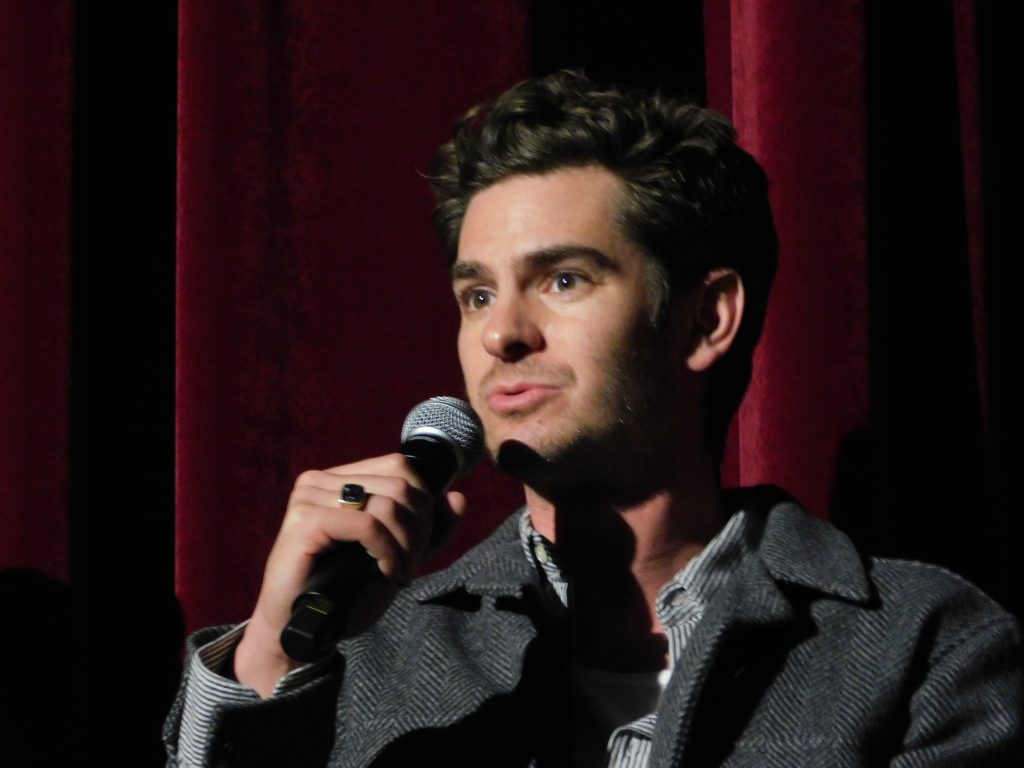
Q: Alexandra, I saw a clip of you thinking about your audition tape for this film on James Corden. I was wondering for those who maybe didn’t get a chance to see it. You said that you really went for it, and I was wondering if you could tell us a little more about that?
Alexandra Shipp : Oh, it is nerve-wracking to see or even thinking about it. When I got the call for this audition, I said yes, everything. What do I need to do? Sure, I’ll throw it on the table, throw my hat in the ring. But Lin-Manuel Miranda . . . okay, I don’t want to mess up the song, do you know what I mean? But at the same time, knowing that Lin appreciates all different types of singers and celebrates those singers, I was like okay, I’m going to send in a tape where I’m doing too many songs. So much sauce on this performance, so he can try and see what else I got. That was initially my goal, and, it kinda worked. I learned. My mom was like, “Will you send me your tape?” and then I watched it and thought “No one is going to see this ever.”
Q: And Robin, I wanted to ask about your audition process, too. I interviewed you previously, and we talked your approach to Michael and how you played the part differently than a lot of actors would and if you could speak to that?
Robin de Jesus : The audition process was really fun, mostly because I have a healthy case of the “Fuck-Its”. This is only dealing with some major singer who wants to make a transition into acting, so I’m going to just do me. And I also thought “Lin’s my boy, but it’s his first time directing. He’s got to navigate a system.” And I’m making up all this shit, right?
So okay, I saw Michael – I was fascinated by the fact that most productions I see Michael he’s always in a suit, and he’s a businessman. I was like, “Top hat.” What I felt was really interesting was like, “Oh, we’re friends and we’re cut from the same cloth even though we project in a very different way.” So I wanted to focus on that guy who was hanging out in the Village, dating and living in SoHo. He had swag too, you know? So he was more interested in that and more interested in the friendship, and that love story there. And then I auditioned, and the beauty of Lin is that my Boriqua(A native of Puerto Rico) brother here saw me, and has a platform in the Village to lift his people, and he chose to give me that moment after twenty years. We all gotta uplift one another and make sure we‘re okay.
Q: Vanessa and Joshua, I feel that the two of you are almost in your own movie, mostly. So if you could speak a little bit about that. Did you feel like you were doing a play within a movie about the play within a musical?
Vanessa Hudgens : We’re just there to support our guys. And I think what made it so fun and so mellow was that we were playing these characters who were actors who were performers who loved performing, supporting their friends in his show. We didn’t have to do too much. We love performing, we love being on the stage. Us singing together is my favorite thing ever, because I love singing to you all as well.
Lin-Manuel Miranda : You can see why I have a singular attachment for her.
Joshua Henry : We had so much fun and I have to say that singing with you and just goofing off and acting, in support of Jonathan Larson, was the medicine that I needed at the time. Because as everyone knows, it was the year of these things being shut down. So we’re very aware of the fact that ninety-nine percent of artists were not working. Anywhere. Especially here in the New York stage. So we got to use our gift and have so much fun together, and we are aware of the fact that we were doing this for our artists’ community because this is our story. So doing that in support of Andrew at a time when he was learning and growing so much as a theatre artist was so natural, and fun at the same time. So yeah, it was a blast and there were moments when we looked at each other and just teared up. After singing some amazing harmonies.
Vanessa Hudgens : Yeah. When we were singing “Louder Than Words”, the lyrics are so powerful, even though it was written thirty years ago. I looked at Josh and I was like “I’m gonna get tattoos on myself.” Yeah, I took myself to the tattoo shop.
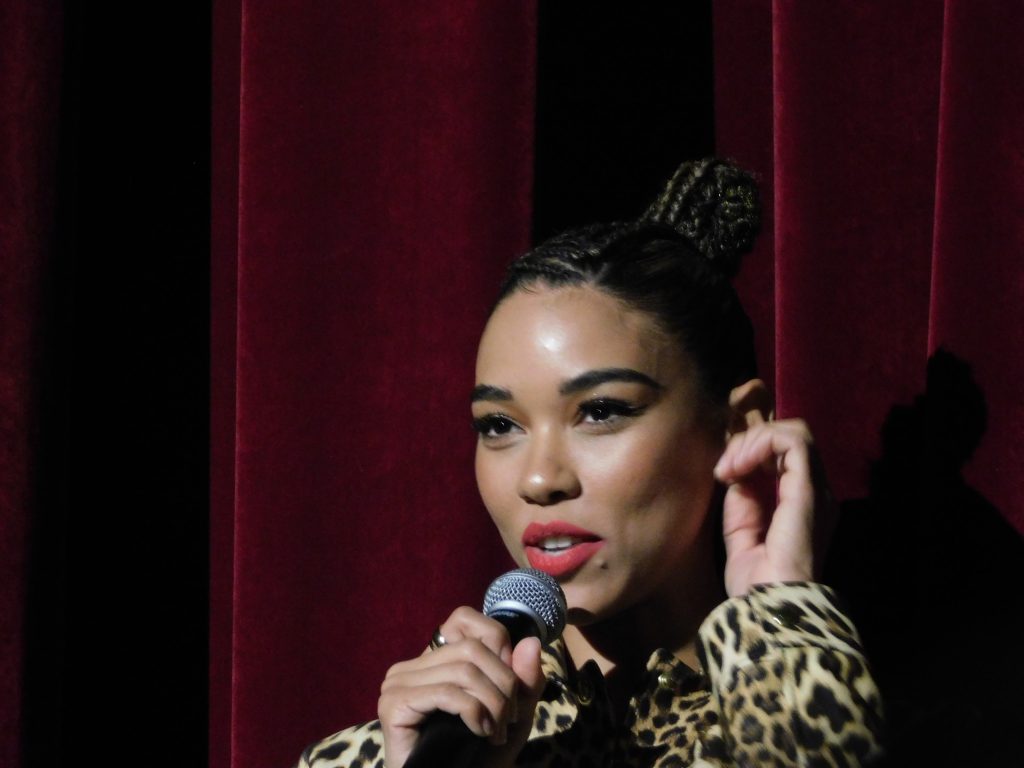
Q: Andrew, was there a song where you felt like the first time – what does the first time singing that you felt like you nailed this, like “This is what I want to sound like”?
Andrew Garfield : Still waiting for that. No, but isn’t that the beauty of that divine dissatisfaction, that no matter how close you get to it, you don’t get there? It’s always at least five percent that you can’t quite reach to, and that’s what keeps us coming back for more. It keeps us more alive. That’s why I keep doing what I’m doing.
I rarely like anything I’ve ever done. This is the closest I’ve ever been to it. And I hate this movie – no, no, I love this movie. No, it’s vulnerable to say that. It’s vulnerable to own that you love something that you’re a part of, and this is one of the very rare things. It’s easy for me to say because it is a collective. It’s like I get to love all these people on the stage and all the people behind the scenes when I say I love this. And I get to love Jonathan.
It’s a lot bigger than me, which is ultimately why we do what we do. It this case, it’s what it means to be an artist, and Jon specifically. And all the people in our lives who left too soon with a half-written song. That was it for me.
But there was a moment in the end of the first week, and it was scheduled for the end of the first week, and it was singing “Why is the Devil Born in Central Park and it was scheduled for the end of the first week. I said “What’s this?” And Lin said, “Yeah, it’s gonna be very good. You’re going to jump in, to dive in, you’re gonna feel great, and it’s out of the way, and you’ll just be clear for the rest of the shoot.” And I go, “No no no no no, why is this here?” And you said, “Because we’re going to lose the Delacorte Theatre if we don’t do it.” . . .
So that was the buildup to that moment. And then when we got to the set, Julie Larson was there that night.
Lin-Manuel Miranda : All that night shoot. We were shooting from sundown to sunup in the Delacorte.
Andrew Garfield : So when we got there, it was a really important thing for both of us that we got at least one great take live vocally. Because it’s an improvised song. He’s figuring out this is very impossible emotional moment that he has to move through with the potential of his heart, his best friend – his heart in this music. It was like, how do I go through this? Obviously, he figures it out through his song. So it was really important that it was live, cracked, raw, and real and honest.
I think we did the second take, we worked with each other and that was a really nice feeling. I suddenly thought “Well, that is the hardest thing, actually. You weren’t lying the first time.
Lin-Manuel Miranda : I was stating the fact that we were going to lose the Delacorte. But it was also true because I have had experience on “Mary Poppins Returns.” The hardest sequence was the first day of shooting, and I was like I wanted to murder everybody . . . As soon as I was done, I had brain space.
Q: I’m glad you brought up that you were shooting this when Broadway was shut down, so many theatre artists were out of work., which I think was one of the reasons why the Sunday sequence was so fun.
Joshua Henry : All of us remember the day that Lin went “I got something I want to show you.” And he described what you just saw. Everything in me was just bursting. That’s what I love about this. We honor people that inspire us to choose this line of work. There’s the most ingenious sequence in the entire movie, and it’s one that I remember when I watched it in L.A. in the Chinese Theater. I always felt like I was on a roller coaster. On that Sunday, it stopped playing.
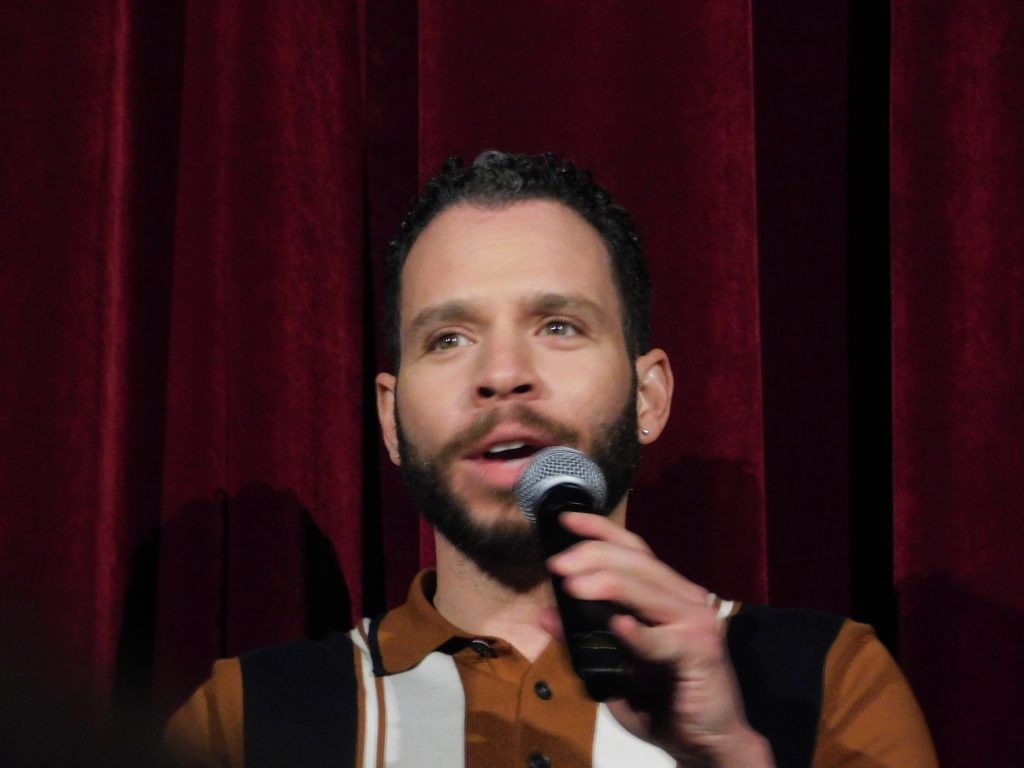
Q: The biggest thing that comes across, watching this movie, is Jonathan’s art, which sometimes comes at the expense of his personal life and his relationships. I guess this is a question for everybody: Do you agree with the choices that he’s making, do you relate to him, do you think that as an artist? How can he balance making life and making art?
Robin de Jesus : I would say that I do think that, the movement you really look into, there’s several different things happening. Because he chooses to stay in it with the art and I think our characters go, “You know what? We signed this contract and now we see the fine print, and I think I’m gonna renegotiate and I’m gonna find my creativity elsewhere.”
Because if you do stay creative, just not following the theatre world, and you buy your thing, I do think that sometimes the intensity that Jonathan had and that passion is also justified by the fact that he knows that that “tick tick” is like ancestors, information coming from the divine, saying “No, actually, this is very, very real.”
Alexandra Shipp : Yeah, and I think that with Jonathan and Susan, there were times where I found myself judging Susan when I was like “Girl, give him 48 hours.”
What I love about Susan is why I fell in love with her as a character is that when you’re an artist your art comes first. And Jonathan’s art was coming first to him but her art became first for her. Because you see at the end of the film, she chooses herself. And I am so grateful that I was given the opportunity to play a woman who chooses herself. So as artists, they’re going to be up in the morning with their keyboards or stroking that paint on that canvas. Because that’s their love, that’s their art.
Andrew Garfield : I’m personally a believer in destiny. I do believe in the idea of destiny. I think for me, that’s what the idea of his taking is that Jonathan is experiencing. There’s a destiny thing happening, and I think it’s very, very hard to interpret and he’s trying to interpret it. Is it 10:30? Is it the biological clock? Is it my friends who are literally getting sick and dying at the age of twenty-one, twenty-two? What is this thinking that I literally keep hearing?
But for me, it was this unconscious knowing – what Robin touched on – that Jon – I — only had until I was thirty-five to write my opus. To leave the world a richer place and know that my destiny was to leave the world a richer place as an artist. And that’s through “Rent”.
And I think as well, that’s the thing about our relationship which is something that is very subterranean and very kindof unsaid, which is “I don’t want to leave the love of my life a widow with a bunch of kids to raise on her own.” That’s some weird known, and that’s a little mystical, but we’re all actors so we get it.
But I really do believe that there was something bigger than he was to happen with his own personal pleasure, his own personal joy, and it was to do with being this mouthpiece for a generation of young men who were being mistreated, young men who had their dignity stripped by the Reagan administration. Young men who were dying and it could have been avoided. Young men who were disrespected and abused.
And I think he knew that he had this bigger destiny, and therefore he had no choice. It was like it was keeping him up at night. He was only able to sleep an hour a night because the Muses were trying to work through and he was touched in that way. That’s my interpretation.
Robin de Jesus : Everything you said about all those folks that get diseases. You look at me: when was the last time you see a Puerto Rican young man in a beard because he’s talking about inheriting HIV
At least we’re over the AIDS epidemic, we’re now back to the ground rules pushing us aside, the women as well. And so it’s so cool to come in now and Jonathan is, like, still the coolest white ally we’ve had in awhile. He gave background material to such great characters that were meaty. We were allowed to have characters that were messy, we were allowed to have feelings freely. These background actors taking over that space, know now, after all those years of “Rent” running, they think “All the people who own homes, now have to have kids, who have insurance . . . .
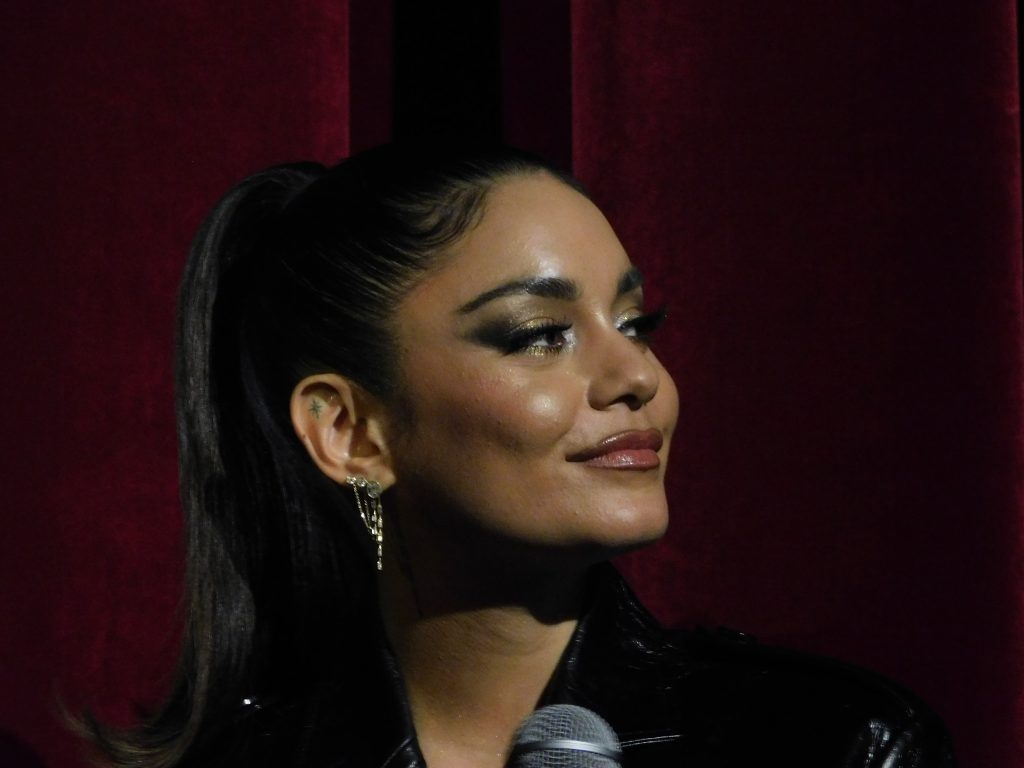
Q: For each of you, which is your favorite song in the film, and what’s your favorite scene in the film?
Joshua Henry : My favorite is definitely “Louder Than Words”, the last one. Because Jonathan poses these incredible questions: cages or wings, right? Fear or love? You see him throughout the film, with these questions right on his thoughts. But he was so mindful, you know what I mean? There was no answer to these questions. He actually said “Don’t say the answer.” But I love that, because it makes you as a person, whether you are an artist or not, examine moment to moment what you’re doing, how you’re thinking, with the time that you have being with the people in front of you. So definitely “Louder Than Words”.
Vanessa Hudgens : I don’t want to say “Therapy” because I’m in it, but – but I really love it with what Lin did with it. The way he chose to tell the story through this song and through this scene. The intercutting between the two was with a very deep, real, difficult conversation to then a performance that is so put on and all those things almost puppet-like. It just feels so frosty and so stylized and beautiful. I think it’s a really special piece of work.
Robin de Jesus : Actually, I do love that baby-making version of “Green Green Dress”
Alexsandra Shipp : My favorite number was “No More”. You all hated that. It was hot.
Lin-Manuel Miranda : I’m having fun with that on Film Docs, because there was a slight slow motion to it. So the first one aired singing at point-two-five [.25] speed. So then it went to regular speed, then a dance-like motion. Then the second chorus is one point five [1.5], then it went a little faster. Then the final volley is one-point-seven-five [1.75] and then they really had at that. But it was so good!
Andrew Garfield : Didn’t we do 23 takes, and two of them were usable?
Lin-Manuel Miranda : Takes 7 and 12 were fakes.
Andrew Garfield : For me, it’s “Come to Your Senses” because I love these voices together and how they merge and they were singing from the same heart, and to one collective heart. It’s movie magic, it’s musical magic, and I just want to sit there in front of both these goddesses with their voices, with this chorus coming out of their mouths. I’ve got to sit down each day.
Each day my feeling with each person is so different, and it was front row best seat in the house and two of the highlight days of the whole filming. And it kills, like Yeah! It kills, right? You can’t help standing up and going “That is musical theatre heaven!”
Lin-Manuel Miranda : Yeah. It was the result of a lot of experimentation to figure out the best way to do “Come to Your Senses”. I always knew I wanted Susan ultimately to sing it. The secret movie inside the movie is that I felt that I could bring through with what it actually feels like to be a writer and to put yourself up. It only exists when other people sing it and make it better. I write books, I write songs, and it doesn’t exist until someone else elevates it.
So that moment – and I’ve had this moment so many times as a writer where I’m watching someone sing something and the audience is experiencing the things inside the play. I remember where I was when I wrote it, I remember what my life was and what I was going through when that came out.
I think of “Hamilton”, I always think that would be enough, which you won’t find in a history book. That was a rare moment of inspiration where Eliza has some shit she has to say to Hamilton, and I had to write it down. It’s weirdly the most personal thing, and I think about everything I think about my partner when I wrote that song. Everyone is experiencing Eliza Hamilton, I’m experiencing a totally different thing.
So I wanted to capture that, and so you’ve got Karessa just burning down the reading with an eleven o’clock number and wailings to the rafter, and that is happening in real life. But also this thing that poured out of Jonathan at the last minute, and so it happened in me, as well.
There’s a scene where Karessa goes to Jonathan and is like, “Are you hearing my song?” and he’s like, “Any day now. You’re killing me.” I literally grabbed just that scene
So there’s a number that is the missing piece of “Superbia”, and then there’s also Jonathan and Susan and all of this stuff that got left unsaid in the last encounter, and all of the things that – how much they love each other, how much they both realize this is not going to happen because the trains aren’t lined up in the right way this time. So his writing the closure doesn’t think it’s going to end. So it gets to work on two levels. If you go down one more key word, inception, and it’s a whole different movie.
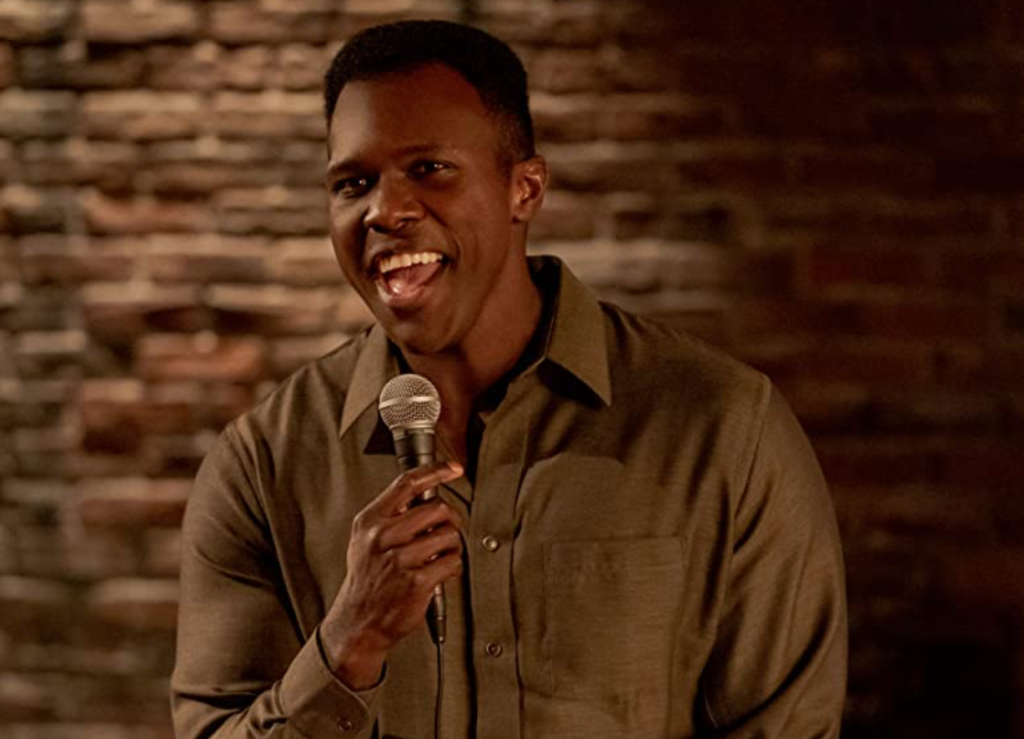
Q: Do you feel you really conquered it?
Lin-Manuel Miranda : I’m really proud of it. Also, another thing I’m proud of is the harmonies in the end. These really came out, because we were workshopping this like we were workshopping the stage musical. I’m going, “Oh really? Because I have two singers. What happens if you do this? [gestures] So that came out as a result of workshopping this the way you’d do workshopping a musical.
But my favorite is – it’s hard to say because it’s “Sunday”. And again, I think about the ways in which we’re links in a change and the way that Stephen Sondheim has mentored generations of artists, because his mentor was Oscar Hammerstein II. Oscar Hammerstein was so gentle, he was so generous with his time, and such a good mentor and father figure, and mentored Jonathan.
Jonathan writes him a love film in the form of his total homage-slash-parody of the greatest end of Act 1 in the history of musical theatre. I realized Jon only ever sang this alone. He only ever sang this at a piano; he never heard a chorus sing it. So I was like, I’m building Jonathan’s dream chorus. The goal was that I make this [special] moment and make this chorus so loud that wherever Jonathan is, he can hear it. That was the mission.
Q: Anything else?
Lin-Manuel Miranda : This thing hit me as a ton of bricks when I was an aspiring artist and wondering whether to continue in this. All I really want it to do for folks is take it in wherever they’re at in their journey. Because it was like a homing beacon for me. It was like, “Hey, buddy, this is getting to be a lot harder than you think. Are you sure? Are you sure? Are you sure?” I was twenty—one years old, it was a sneak preview of my twenties, and I was. And I was willing to do whatever to make what I was supposed to make to do the jobs no one else wanted to do, to make the thing.
And the other thing I wanted to do – and you touched on this – Susan’s right: you can dance whenever you want. You can still be a dancer. You can make your art forever. And Michael’s right: you deserve to be safe. You deserve to live in a place and have health insurance and you deserve to have security.
I need to make choices and I know that. We want us to make choices – not like I’m “selling out”, but viable paths for us. Those are viable paths for any of us.
Here’s the trailer of the film.

